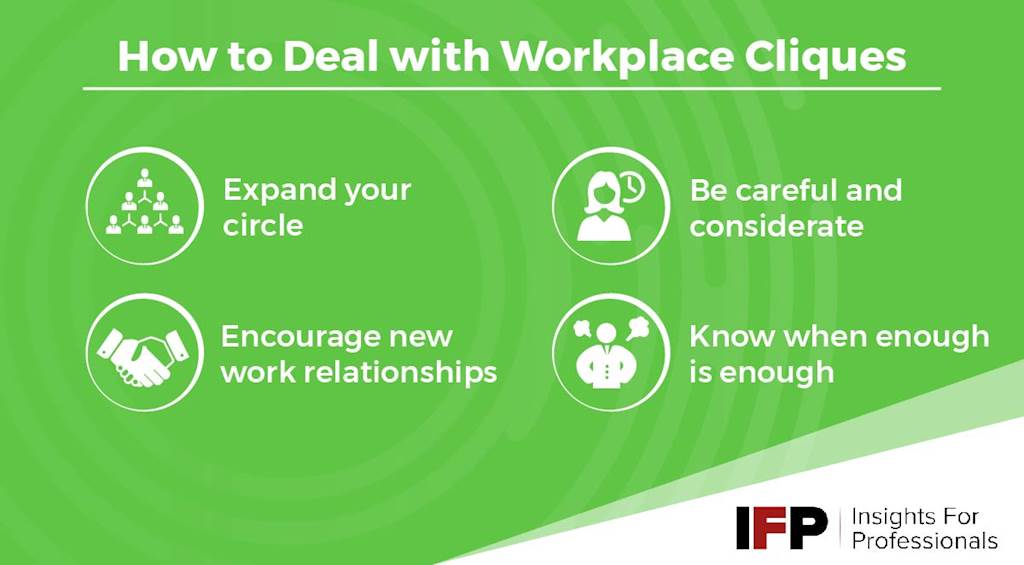But if you think cliques are a thing of the past, then think again. Research by CareerBuilder found that 43% of workers in the US say their office or workplace is populated by cliques, whilst a further 20% say they have done something they’re not interested in just to fit in with their co-workers.
Although workplace cliques can sometimes be appealing, as being part of a certain group shows you are team player, allows you to socialize with those who are successful and can give you value by association, cliques within the workplace can also influence job satisfaction and promote animosity amongst peers.
However, there are some things you can do to tackle this. Read on to find out:
- How can cliques effect your job?
- How to handle workplace cliques
- When it’s time to leave your job
How can cliques effect your job?
The Merriam-Webster Dictionary defines a clique as ‘a narrow, exclusive circle or group of persons; especially: one held together by common interests, views, or purposes.” But not to be confused with a team, cliques can also be a form of exclusion and rejection.
Being part of the dominant group within your office may seem appealing, but it might not be the best career move. Even if you think you are hanging out with the “in” crowd or the “A+ performers”, as CNN reports, you can just easily be associated the “D+ crowd” depending on how management view the people you are regularly seen with.
This can label you with the common ‘guilty by association’ phrase and be damaging to your career progression. Amy Hoover, president of Talent Zoo says: “It’s easy to get labelled as part of ‘that group’ and then it becomes part of your identity. Sometimes who you associate with is who you become to a boss or manager.”
Often, cliques are linked to gossiping about people in the office, which can be particularly hurtful to those who find themselves being talked about. This type of bullying at work can have harsh consequences for those both in and out of the clique, changing the office dynamic dramatically. Gossiping can also have impacts on your development in the company, particularly if you have just started.
How to handle workplace cliques
There is nothing wrong with being social at work, and it definitely isn’t a crime to hang out with people who have the same interests. However, if you see that groups are starting to alienate certain people, or you start to feel excluded from certain groups at work, there are a few things you can do to help:

Expand your circle
Practicing your own inner-office networking allows you to get to know colleagues you don’t see as regularly and means you can avoid being associated with one single group. If there are certain members in a clique that you want to be friends with, try approaching this individual at a time when they are on their own or away from the rest of the clique. Diane Gottsman, etiquette expert and modern manners authority said: “Expanding your circle of professional connections isn’t limited to mixers and community functions. Challenge yourself to reach out to colleagues you don’t see regularly. You may potentially be overlooking an alliance or mentorship opportunity.”
Be careful and considerate
Gossiping about the contestants on the latest series of The Apprentice is somewhat different to gossiping about what someone at work has done to annoy you. It’s best to keep your opinions to yourself and not get involved in bad-mouthing anyone, whether they are a co-worker or manager. Lisa Skeete Tatum, founder and CEO of Landit said: “Make it clear to your colleagues that you’re not interested in gossiping or getting in the middle of drama. Don’t comment or add fuel to the fire or rumors. Avoid associating with troublemakers, too.”
Be careful to not gossip outside of the office too, as you never know who could be listening, or watching. Posting negative comments on social media sites can be damaging to your reputation, career and can get you “Facebook fired”. Even if you aren’t friends with any of your work colleagues, people can still find comments you’ve posted and once it’s been published, its online for everyone to see, whether you delete it or not.
Encourage new work relationships
If you are a manager, it’s important not to show favoritism when delegating new tasks as this can spark gossip and cliques within the company. Organizing group activities for the whole office can encourage people to step out of their comfort zone and speak to people they don’t usually talk to in the office. Not only will this improve the overall morale in the office if there is an issue with cliques, it will also develop teamwork and productivity amongst your employees.
Know when enough is enough
Roxana Hewerston, president and CEO of the Highland Consulting Group said: “Sometimes it’s worth it to wait it out, and sometimes it’s not.” If the bad atmosphere of the office is causing you to feel as though you would be better off leaving the company, it’s time to consider how big the problem is. If you don’t feel like you “fit” in the company anymore and all you do is complain about your job, it might be time to leave it behind and look for somewhere where you would be happier.
Remembering why you started working at the company is important, but if the reasons for leaving now outweigh these and the drama amongst co-workers is getting to much, it might just be time to say goodbye.
Access the latest business knowledge in HR
Get Access










Comments
Join the conversation...